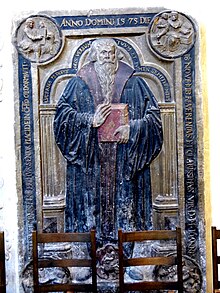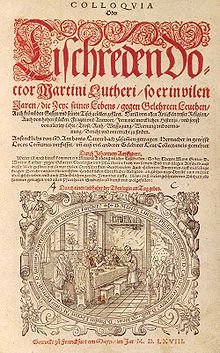Johannes Aurifaber (Vimariensis)
Johannes Aurifaber , Latinized from Johann Goldschmied (* around 1519 in Weimar ; † November 18, 1575 in Erfurt ), was a Lutheran theologian of the 16th century and a reformer . He was also called Johannes Aurifaber Vimariensis (Johann Goldschmied from Weimar) to distinguish it from the contemporary Breslau of the same name .
Life

Nothing is known about the environment from which Johannes Goldschmied (also reproduced as Goldschmiedt, Goldschmid and Goldschmidt) comes. In 1537 he began his studies at the Artistic Faculty of the University of Wittenberg , which Count Albrecht von Mansfeld sponsored. In 1539 he became a bachelor , after which he received the degree of Magister artium . From 1540 to 1543 he taught two young Mansfeld counts in Wittenberg . In 1544/45 he accompanied Count Vollrad von Mansfeld as a field preacher to France . In 1545 he returned to Wittenberg, began to study theology, moved into Luther's house and became Martin Luther's last clerk . Aurifaber accompanied Luther on his travels to Mansfeld (December 22, 1545 - January 7, 1546) and Eisleben (January 23 - February 18, 1546). In the Schmalkaldic War he was field preacher Johann Friedrichs von Sachsen . In 1547 he was employed in Weimar by the court preacher Johann Stoltz , who previously wrote at Luther's table, was appointed second court preacher in 1550 and after the death of the old court preacher Stoltz he took over the court preaching office on July 15, 1556. On May 1, 1552, he received 40 guilders to buy a house and in 1559 acquired a small estate.
Aurifaber was with the imprisoned Johann Friedrich from May 1552 until his release on September 1, 1552. He supported the Gnesiolutherans and took care of their appointment to the University of Jena since 1556 . In 1548 he signed the report against the Augsburg Interim , in 1552 he participated in the statement on the Osiandrischen dispute . In January 1556 he demanded that the adiaphorists revoke it, in August he was present at the interrogation of Justus Menius , whom he was pursuing with Nikolaus von Amsdorf .
Aurifaber campaigned for the drafting of an Ernestine confession, the Weimar Confutation Book , which he gave the polemical form with Matthias Flacius before it appeared in 1559. When the Weimar court separated from the Gnesiolutherans in 1561, Aurifaber received his departure on October 22, 1561. He retired to Eisleben , where he could devote himself to his editorial work.
From there Aurifaber fled from the plague to Erfurt in 1565 , where he became pastor at the Predigerkirche in 1566. In 1569 the Erfurt pastor Johannes Gallus was elected rector of the University of Erfurt . The senior of the Erfurt Ministry, Andreas Poach, advised rejecting the election unless the Roman Catholic celebrations at the handover of the rectorate were canceled. Aurifaber took Gallus's side. The dispute was carried out on the pulpits until the city council of Erfurt dismissed Poach in Holy Week 1572 and made Aurifaber a senior. After four followers of Poach were released on July 15, 1572, he was able to work in peace for a few years until he died on November 18, 1575. The tombstone in the Erfurt Predigerkirche shows his portrait.
plant
It was determined by the passion to collect unpublished things from Luther and sources that could serve the understanding of the Lutheran Reformation and to make known in order to promote Luther's continued work. He laid the foundation for his collection in 1540 by copying autographs , writing down Luther's sermons and Genesis lectures. After Luther's death he began to collect more by traveling. As the first fruit of this activity, he published Luther's four last sermons in 1546. In 1547 a collection of consolation and a collection of consolation followed, in 1550 a German interpretation of Psalm 129.
On June 10, 1553, Georg Rörer was called to Jena by Johann Friedrich to take care of a Luther edition. Aurifaber was put at his side. Well prepared by his collecting activity, he took over the compilation and procurement of the templates. On August 31, 1553, he suggested that especially unprinted items be brought out of Rörer's postscript. But Johann Friedrich only wanted to record what Luther had published. After the latter died, Aurifaber renewed his plan and found approval. A special edition of Latin letters was planned, and unpublished items were included in the German volumes of the Jena Luther edition. Since the summer of 1555, Aurifaber, with the diplomatic help of the Ernestine dukes, has been getting more copies. He went on trips to northern and southern Germany, sent out messengers to fetch manuscripts or scribes to make copies. The material was given to Rörer, who was able to enlarge his collection, but also to Aurifaber. In the summer of 1556, at Aurifaber's urging, the dukes acquired Rörer's collection. On March 30, 1556, Aurifaber requested inspection of the files relating to the Augsburg Diet of 1530 and material from the Landgrave of Hesse on the Marburg Religious Discussion .
In 1556, the first volume of Latin Luther Letters from 1507 to 1522, which Aurifaber had edited, was offered in Leipzig. The second volume was not printed in 1558. The Jena Luther edition appeared in twelve volumes from 1553 to 1558 and was completed by Aurifaber without the late Georg Rörer.
In Eisleben, Aurifaber was able to partially realize his long-cherished plans. In 1564 and 1565 two volumes appeared with German books, writings and sermons of Luther from the years 1516 to 1538 as a supplement to the Wittenberg and Jena Luther editions, also in 1565 the second volume with Latin Luther letters up to 1528. His most successful publication appeared in 1566, the table speeches or “ Colloquia Doct. Mart. Luther's ”. It had more than 20 editions, the last one to date was published in 1983. Aurifaber translated the text passages notated in Latin into German. What he saw no possibility of printing, he distributed by hand.
Aftermath
Up until the 19th century, Aurifaber determined the output of Luther's letters, sermons and speeches. Critical editions of the letters began in 1825, those of the sermons and table speeches in 1883 with the Weimar Luther edition. Aurifaber wanted to make the incomplete postscripts understandable by adding them. This procedure met with resistance from his contemporaries.
From the 19th century onwards, he was said to have carelessly dealt with his models due to the historical-critical method. He was suspected of not having viewed files, of suppressing Rörer's postscripts, of spinning table speeches from sermons, lectures and letters, and of wrongly boasting of his own postscripts. However, these judgments lack the proof that the same templates were used for comparison that Aurifaber used. The book and Bible drawings as well as the consolation scripts showed that he had the better text.
The discovery of his collective manuscripts gave him the reputation of being “a busy literary businessman” who wrote briefly to earn money. But the sources hardly allow a judgment to be made as to whether he was approached as a collector or whether his collection was offered. The judgment on payments must respect 16th century practice. He has done a great deal to transmit Luther's utterances. He did not suppress anything to idealize Luther. Some pieces only came to us through him. His dependence on transcripts, his processing technique and his willingness to conjecture require critical consideration. At the Witteberg town hall there is a memorial plaque that has his name in memory.
literature
- Gustav Hammann: Aurifaber, Johann. In: New German Biography (NDB). Volume 1, Duncker & Humblot, Berlin 1953, ISBN 3-428-00182-6 , p. 457 ( digitized version ).
- Julius August Wagenmann: Aurifaber, Johann . In: Allgemeine Deutsche Biographie (ADB). Volume 1, Duncker & Humblot, Leipzig 1875, p. 691.
- Aurifaber, Johann, a Lutheran theologian. In: Johann Heinrich Zedler : Large complete universal lexicon of all sciences and arts . Supplement 2, Leipzig 1751, column 973 f.
- Robert Stupperich : Reformatorenlexikon . Max Mohn, Gütersloh 1984, ISBN 3-579-00123-X
- Helmar Junghans : Aurifaber, Johannes. In: Theologische Realenzyklopädie (TRE) Volume 4, 1979, ISBN 3-11-007714-0 , pp. 752-755
- Helmar Junghans: Epilogue. In: Tischreden or Colloqvia Doct. Mart. Luther's, as he said in many years against gelart people, also foreign gestures, and his table companions, compiled after the hustle and bustle of our Christian reading . (Edition Leipzig 1981) Drei-Lilien-Verlag, Wiesbaden 1983, ISBN 3-922383-09-2 , Appendix, pp. 1-19.
- Gustav Kawerau Wagenmann: Aurifaber, Johannes (Vinariensis). In: Realenzyklopädie für Protestantische Theologie und Kirche (RE), 3rd edition, Volume 2, 1897, pp. 290-293
- Friedrich Wilhelm Bautz : Aurifaber, Johannes (Vimariensis). In: Biographisch-Bibliographisches Kirchenlexikon (BBKL). Volume 1, Bautz, Hamm 1975. 2nd, unchanged edition Hamm 1990, ISBN 3-88309-013-1 , Sp. 303-304.
Web links
Footnotes
- ↑ Helmar Junghans (1983), p. 12.
- ^ Table speeches or Colloqvia Doct. Mart. Luther's, as he said in many years against gelart people, also foreign gestures, and his table companions, compiled after the hustle and bustle of our Christian reading . With an afterword by Helmar Junghans. (Edition Leipzig) Drei-Lilien-Verlag, Wiesbaden 1983, ISBN 3-922383-09-2 .
- ↑ D. Martin Luther's table speeches or Colloquia, if he led against learned people, also foreign guests and his table companions for many years [...]. Edited from Aurifaber's first edition with careful comparison of both the Stangwald and Selneceer editors. and explained by Karl Eduard Förstemann and Heinrich Ernst Bindseil . Berlin 1848, especially Volume 4, pp. XXIII-LII.
| personal data | |
|---|---|
| SURNAME | Aurifaber, Johannes |
| ALTERNATIVE NAMES | Goldsmith, Johannes |
| BRIEF DESCRIPTION | German Lutheran theologian and reformer |
| DATE OF BIRTH | around 1519 |
| PLACE OF BIRTH | Weimar |
| DATE OF DEATH | November 18, 1575 |
| Place of death | Erfurt |

